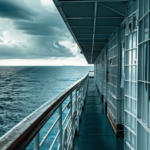When it comes to cruise ships, there is a fascination with the unknown. From the ocean’s vastness to the luxurious amenities onboard, these floating cities are a world of their own. But amidst the glamor and excitement, one question piques the curiosity of many: do cruise ships have jails?
In this article, we will delve into the truth behind this mystery. We’ll explore whether cruise ships are equipped with jails to handle onboard incidents and discuss some cruise tips related to maintaining order at sea.
Understanding Security on Cruise Ships
Before delving into the common question of does a cruise ship have a jail, let’s take a look at the overall security on cruise ships. When it comes to ensuring passenger safety, cruise ships prioritize implementing comprehensive security measures. One common question arises: is there a jail on a cruise ship to handle potential incidents? Let’s dive into this topic and better understand the security protocols in place.
The primary goal of cruise ship security is to create a safe and enjoyable environment for all passengers. Although the presence of a cruise ship jail is often rumored, it is quite rare. Instead, these floating vessels rely on proactive prevention strategies and the expertise of their security personnel to maintain order.
Highly trained security officers are an essential part of the cruise ship staff. They are responsible for monitoring and patrolling the ship to identify potential security risks. These officers undergo rigorous training programs, including crisis management and emergency response protocols, to ensure they can handle any situation that arises.
In addition to the visible security personnel, cruise ships also have advanced surveillance systems. These systems utilize state-of-the-art technology, including CCTV cameras strategically positioned throughout the ship, to monitor public areas and keep a watchful eye on any suspicious activities.
Security and Crisis Response Teams
- The security team works closely with other onboard staff members, such as the ship’s captain, guest services, and medical personnel, to coordinate and respond effectively to any incidents.
- In the event of disturbances or unlawful activities, the security team acts swiftly, following established protocols, to ensure the safety and well-being of all passengers.
- Depending on the severity of the situation, they are trained to de-escalate situations, detain individuals if necessary, and alert relevant authorities onshore.
It is important to note that most onboard incidents, if any, are minor in nature and are effectively handled by the ship’s security team. Additionally, passengers’ cooperation and assistance play a vital role in maintaining order and ensuring a safe cruise experience for everyone.
So, while the presence of a cruise ship jail may be rare, a robust security framework is in place to handle any potential onboard incidents. By understanding these security measures and cooperating with the crew, passengers can have peace of mind and enjoy their cruise without concerns.
Onboard Incident Management
When it comes to ensuring a safe and enjoyable experience for all passengers, cruise ships have well-defined protocols and procedures in place to handle any incidents that may occur during a voyage. From disruptive behavior to unlawful activities, the ship’s crew is trained to manage and address these situations swiftly and effectively.
One key method cruise ships employ to maintain order is establishing designated areas to temporarily hold individuals involved in disruptive behavior. These areas isolate the individuals until appropriate action can be taken. While these areas may be commonly referred to as “jails,” they are typically small holding spaces and should not be confused with traditional land-based incarceration facilities.
When an incident occurs, the ship’s security personnel are responsible for assessing the situation and determining the appropriate course of action. These highly trained professionals work closely with the ship’s management, following established protocols to ensure the safety of all passengers and crew members.
In more serious cases involving criminal activities, the relevant authorities and legal jurisdictions can intervene. Cruise lines have procedures in place to cooperate with law enforcement agencies and provide the necessary support during investigations. This ensures that unlawful activities are handled according to the appropriate legal framework.
Passenger safety is a top priority for cruise ships, and the crew is committed to maintaining order and addressing any possible incidents. By following the ship’s staff’s instructions and adhering to onboard rules, passengers can contribute to creating a safe and enjoyable environment for everyone on board.
Legal Jurisdiction at Sea
When incidents occur onboard a cruise ship, it is important to understand the legal jurisdiction and authorities involved to ensure justice at sea. Cruise ships operate under a complex legal framework that considers multiple factors, including the ship’s flag state, the victim and perpetrator’s nationality, and the incident’s location.
Each cruise ship is registered under the flag of a specific country, known as its flag state. The flag state is responsible for regulating the ship and enforcing its laws while it is at sea. In most cases, the flag state has jurisdiction over crimes committed on board the ship, regardless of the nationality of the individuals involved.
However, the legal jurisdiction can become more complicated when a crime occurs onboard a cruise ship. The nationality of the victim and perpetrator can affect which country has jurisdiction over the case. Additionally, the location of the incident can also impact the jurisdiction, especially when the ship is in international waters.
International Waters and Territorial Jurisdiction
International waters are areas beyond any country’s territorial boundaries. No single country has complete jurisdiction in these waters. However, international agreements and conventions, such as the United Nations Convention on the Law of the Sea, establish guidelines for handling crimes at sea.
The legal jurisdiction becomes more complex when a cruise ship is in international waters. In general, crimes committed in international waters are subject to the jurisdiction of the country where the ship is flagged and the country of the victim and perpetrator. Additionally, if the ship has a port of call nearby, the jurisdiction of that country may also come into play.
- The cruise line’s security personnel and onboard security procedures are crucial in maintaining order and ensuring passenger safety.
- If an incident occurs onboard, the ship’s security team will conduct initial investigations and work closely with the relevant authorities to ensure appropriate actions are taken.
- If needed, the ship may be required to dock at a port to hand over the perpetrator to the local authorities for further legal proceedings.
It is important to note that cruise lines prioritize passenger safety and cooperate with law enforcement agencies to resolve any legal matters that arise onboard their ships. They have established protocols and procedures in place to handle incidents and ensure justice is served.
Understanding the legal jurisdiction at sea can help passengers comprehend the complexities of handling criminal activities onboard a cruise ship. By working with the proper authorities, cruise lines strive to maintain safety and ensure that justice is served for any incidents that may occur during a voyage.
Maintaining Order and Safety
When embarking on a cruise, passengers need to prioritize safety and contribute to a harmonious environment onboard. Here are some valuable cruise tips to ensure a safe and enjoyable experience:
Stay Informed about Safety Procedures
Familiarize yourself with the ship’s safety protocols as soon as you embark. Attend the mandatory muster drill and pay attention to the safety briefing. Knowing the location of emergency exits, life jacket stations, and muster points will help you respond calmly and confidently in case of an emergency.
Follow Onboard Rules
Respect the ship’s rules and regulations to maintain a safe and orderly environment. Follow instructions from the crew members and security personnel, especially during emergencies. Be mindful of signage and warnings, and avoid engaging in disruptive behavior that could jeopardize the safety and comfort of fellow passengers.
Be Alert and Vigilant
Keep an eye on your belongings and report any suspicious activities or unattended items to the crew. While cruise ships are generally safe, it is always a good idea to remain cautious and aware of your surroundings.
Practice Good Hygiene
Personal hygiene is crucial to prevent the spread of illnesses on a cruise ship. Wash your hands regularly using soap and water or hand sanitizers provided onboard. Follow proper respiratory etiquette, such as covering your mouth and nose when coughing or sneezing.
Stay Updated with Safety Announcements
Listen attentively to safety announcements and updates from the ship’s captain or crew members. They will provide important information regarding onboard procedures, weather conditions, and potential safety concerns. Stay connected to the ship’s communication channels and be aware of any changes in the itinerary.
Practice Responsible Alcohol Consumption
If you decide to drink alcohol while on board, it’s important to do so responsibly. Overindulgence can lead to impaired judgment and heighten the likelihood of accidents or conflicts. Be sure to pace your drinking, keep hydrated, and be aware of your personal limits to maintain your safety and that of others.
Following these cruise tips and maintaining a vigilant approach can contribute to a safe and enjoyable voyage for yourself and your fellow passengers. Prioritizing safety and adhering to onboard rules will help create a harmonious environment that allows everyone to make the most of their cruise experience.
Prevention and Security Measures
Cruise lines have implemented a range of prevention and security measures to ensure passengers’ safety and security. These measures are designed to minimize incidents and maintain a secure environment throughout the voyage. Let’s explore some of the strategies cruise ships employ:
Surveillance Systems
Cruise ships are equipped with state-of-the-art surveillance systems that monitor various areas onboard. These systems include CCTV cameras strategically placed throughout the ship, allowing security personnel to monitor activities and detect suspicious behavior.
Trained Security Personnel
Cruise ships have a dedicated team of trained security personnel onboard. These individuals undergo rigorous training programs to handle various security situations effectively. They are responsible for maintaining order and responding promptly to any incidents that may occur.
Access Control
Access control measures ensure that only authorized individuals have access to certain areas of the ship. This helps prevent unauthorized personnel from entering restricted areas and enhances the overall security of the vessel.
Emergency Response Procedures
Cruise lines have well-defined emergency response procedures to address any security-related incidents. These procedures include protocols for handling medical emergencies, fire incidents, and other crises.
Collaboration with Law Enforcement
Cruise lines work closely with local authorities and law enforcement agencies in their visiting ports. This collaboration ensures that any reported incidents onboard are handled appropriately and in accordance with the law.
Cruise lines strive to provide passengers with a safe and secure environment by implementing these prevention and security measures. However, passengers should always take their own precautions and follow essential cruise tips to enhance their personal safety onboard.
Bottom Line
In conclusion, while it is true that some cruise ships have designated areas to temporarily hold passengers involved in disruptive behavior, the presence of actual jails on cruise ships is rare. Instead, comprehensive security measures, incident management protocols, and legal cooperation ensure that order is maintained at sea.
By following essential cruise tips, such as staying informed about safety procedures and adhering to onboard rules, passengers can contribute to a safe and enjoyable voyage. It is essential to respect fellow passengers and report any suspicious or illegal activities to the appropriate authorities on the ship.
Cruise lines prioritize the safety and security of their passengers. They strive to minimize incidents and maintain a secure environment by using surveillance systems, trained security personnel, and effective prevention measures. Collaborating with legal jurisdictions both on land and at sea ensures that justice can be served for any criminal activities that occur onboard.





